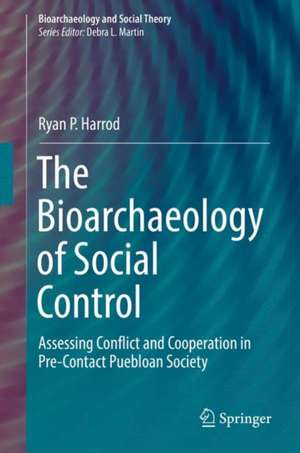The Bioarchaeology of Social Control: Assessing Conflict and Cooperation in Pre-Contact Puebloan Society: Bioarchaeology and Social Theory
Autor Ryan P. Harroden Limba Engleză Hardback – 28 sep 2017
| Toate formatele și edițiile | Preț | Express |
|---|---|---|
| Paperback (1) | 573.26 lei 38-44 zile | |
| Springer International Publishing – 18 aug 2018 | 573.26 lei 38-44 zile | |
| Hardback (1) | 697.97 lei 43-57 zile | |
| Springer International Publishing – 28 sep 2017 | 697.97 lei 43-57 zile |
Din seria Bioarchaeology and Social Theory
-
 Preț: 357.04 lei
Preț: 357.04 lei - 18%
 Preț: 732.70 lei
Preț: 732.70 lei - 20%
 Preț: 538.73 lei
Preț: 538.73 lei -
 Preț: 394.12 lei
Preț: 394.12 lei - 18%
 Preț: 1117.34 lei
Preț: 1117.34 lei -
 Preț: 391.99 lei
Preț: 391.99 lei - 18%
 Preț: 738.06 lei
Preț: 738.06 lei - 15%
 Preț: 701.06 lei
Preț: 701.06 lei - 15%
 Preț: 585.57 lei
Preț: 585.57 lei - 18%
 Preț: 896.52 lei
Preț: 896.52 lei - 18%
 Preț: 728.11 lei
Preț: 728.11 lei - 18%
 Preț: 731.10 lei
Preț: 731.10 lei - 15%
 Preț: 498.79 lei
Preț: 498.79 lei - 18%
 Preț: 953.03 lei
Preț: 953.03 lei - 18%
 Preț: 890.37 lei
Preț: 890.37 lei - 18%
 Preț: 726.55 lei
Preț: 726.55 lei -
 Preț: 385.47 lei
Preț: 385.47 lei - 24%
 Preț: 683.08 lei
Preț: 683.08 lei - 24%
 Preț: 863.80 lei
Preț: 863.80 lei - 24%
 Preț: 733.59 lei
Preț: 733.59 lei - 15%
 Preț: 643.34 lei
Preț: 643.34 lei
Preț: 697.97 lei
Preț vechi: 821.14 lei
-15% Nou
Puncte Express: 1047
Preț estimativ în valută:
133.55€ • 139.82$ • 110.51£
133.55€ • 139.82$ • 110.51£
Carte tipărită la comandă
Livrare economică 07-21 aprilie
Preluare comenzi: 021 569.72.76
Specificații
ISBN-13: 9783319595153
ISBN-10: 3319595156
Pagini: 181
Ilustrații: XIX, 172 p. 13 illus., 5 illus. in color.
Dimensiuni: 155 x 235 mm
Greutate: 0.45 kg
Ediția:1st ed. 2017
Editura: Springer International Publishing
Colecția Springer
Seria Bioarchaeology and Social Theory
Locul publicării:Cham, Switzerland
ISBN-10: 3319595156
Pagini: 181
Ilustrații: XIX, 172 p. 13 illus., 5 illus. in color.
Dimensiuni: 155 x 235 mm
Greutate: 0.45 kg
Ediția:1st ed. 2017
Editura: Springer International Publishing
Colecția Springer
Seria Bioarchaeology and Social Theory
Locul publicării:Cham, Switzerland
Cuprins
Chapter 1: Understanding the Chaco Phenomenon.- Chapter 2: Culture, Corn, and Complexity.- Chapter 3: Systems of Social Control.- Chapter 4: Chaco Canyon.- Chapter 5: Putting Chaco Into Context.- Chapter 6: Putting the People Back Into the Pueblos.- Chapter 7: Reassessing ‘pax Chaco’.- Chapter 8: The Role of Elites and Social Control.- Chapter 9: the Decline of Social Control in the Pueblo World.- Chapter 10: Conclusion.
Notă biografică
Ryan Harrod has a Ph.D. from the University of Nevada, Las Vegas (2013) and is currently an Assistant Professor of anthropology at the University of Alaska Anchorage. His research and expertise are in bioarchaeology, paleopathology and forensic anthropology. Working primarily with ancient and historic human remains, he is most interested in questions having to do with identity, health and disease, conflict and violence, social inequality, ethics, and repatriation.
Textul de pe ultima copertă
Taking a bioarchaeological approach, this book examines the Ancestral Pueblo culture living in the Four Corners region of the United States during the late Pueblo I through the end of the Pueblo III period (AD 850-1300). During this time, a vast system of pueblo villages spread throughout the region creating what has been called the Chaco Phenomenon, named after the large great houses in Chaco Canyon that are thought to have been centers of control. Through a bioarchaeological analysis of the human skeletal remains, this volume provides evidence that key individuals within the hierarchical social structure used a variety of methods of social control, including structural violence, to maintain their power over the interconnected communities.
Caracteristici
Gives bioarchaeological insight into social control and violence in complex societies Compares Chaco Canyon to research findings at other archaeological sites that appeared to have served as centers for large regional complexes Illustrates how violence in the form of social control is often used as a means of establishing and maintaining peaceful relations in complex societies Includes supplementary material: sn.pub/extras
